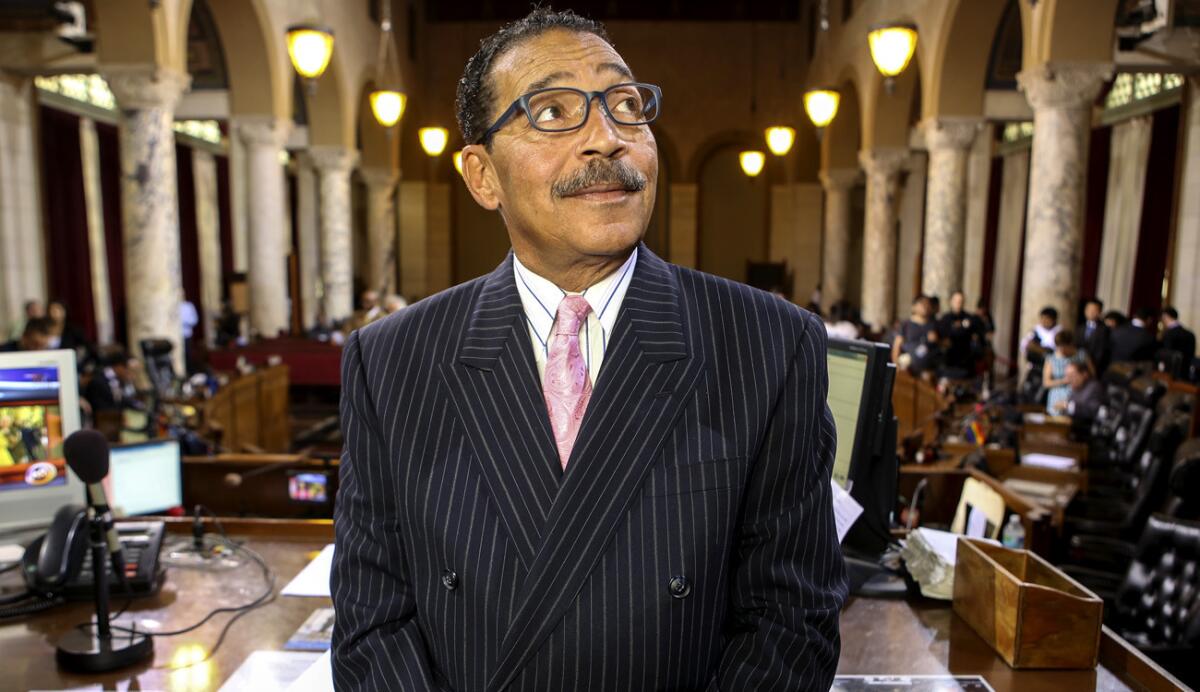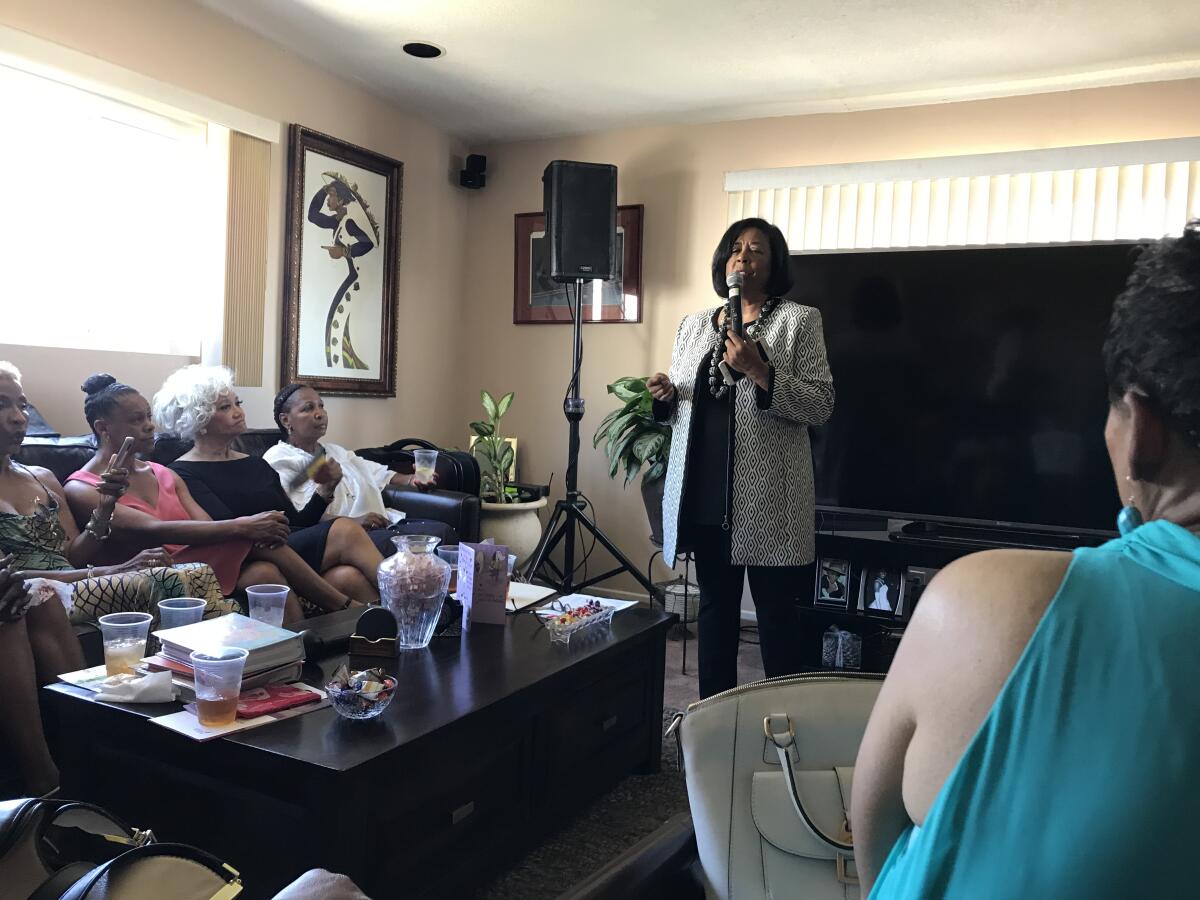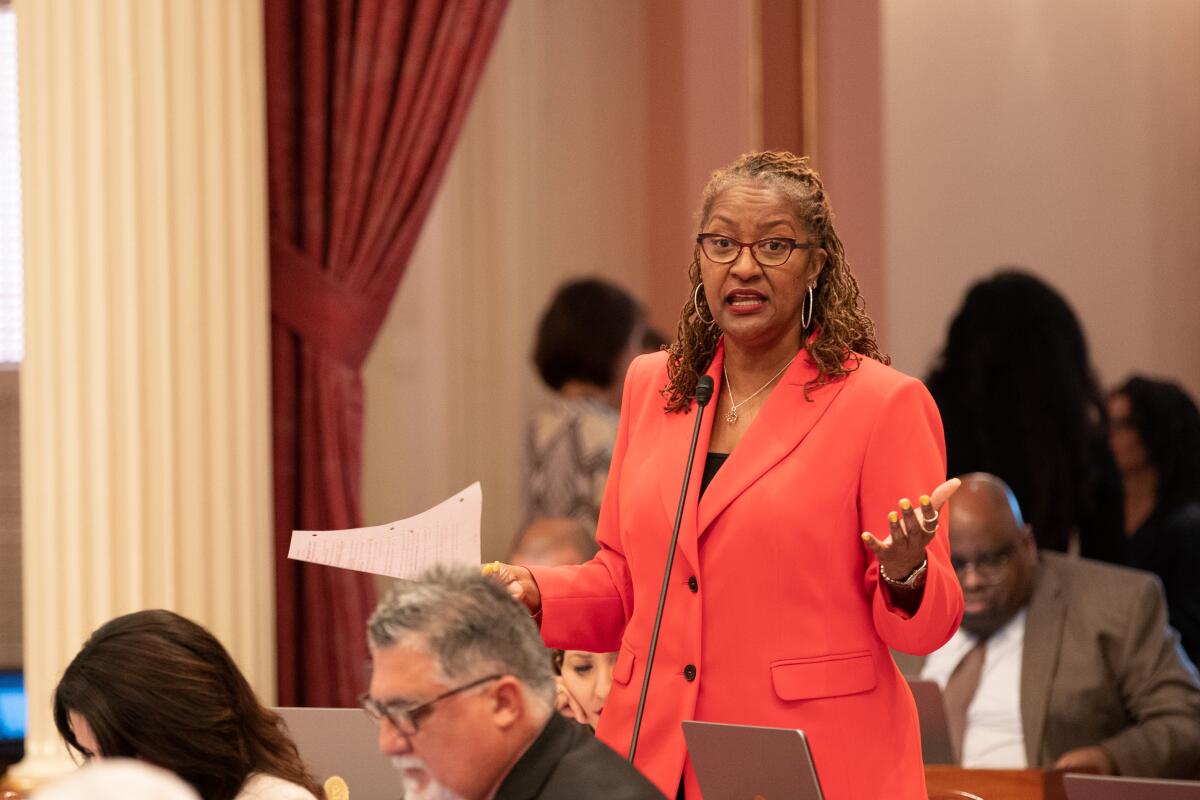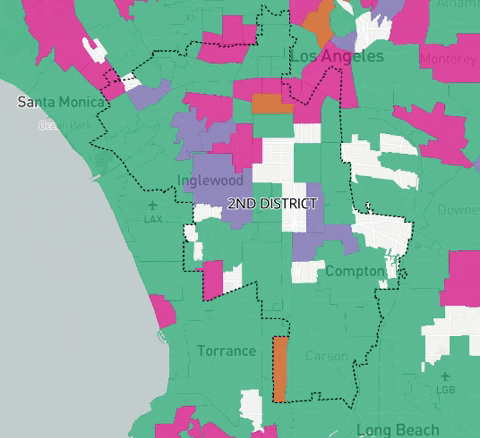With charges of ‘cheating’ and ‘Trump-like tactics,’ L.A. County supervisor race heats up

- Share via
With the March primary election rapidly approaching, the stakes are high in the race for a rare open seat on the Los Angeles County Board of Supervisors.
Until now, it has been a largely civil affair, with L.A. City Council President Herb Wesson the perceived front-runner to replace term-limited Supervisor Mark Ridley-Thomas. But the gloves are finally starting to come off.
In recent weeks, Wesson and his top rivals, state Sen. Holly Mitchell and former City Council member Jan Perry, have been embroiled in a dispute over the Los Angeles County Democratic Party’s endorsement of Wesson.
“What we think happened is that Herb Wesson tried to win by cheating,” said Eric Hacopian, a consultant for Perry. “They tried to game the system when they didn’t have the votes.”
At issue is the way the party’s Dec. 10 vote was conducted at United Teachers Los Angeles headquarters in Koreatown. The process is usually swift and occurs without controversy, following candidate recommendations from a party committee. In this case, however, the committee was a vote short of a consensus to recommend Wesson. That prompted a floor vote, in which Wesson won the endorsement by one vote.

Scores of voting members and alternate members from the party, as well as nonvoting Democratic activists and campaign staffers, crowded into the conference room as the ballots were cast. The chaos and close tally led to questions by the Perry and Mitchell campaigns.
On Dec. 20, Perry’s staff reviewed the ballots cast for Wesson and reported finding 11 problems.
In response, Democratic Party officials launched an internal review. The party’s leadership has defended the process, however, saying the endorsement will likely stand after an appeals committee hears a challenge from Perry’s campaign on Sunday.
Wesson’s campaign also stands by the results.
“Our opponents, who are attempting to destabilize our party and disenfranchise Democratic Party voters to steal an election, sound a lot more like Donald Trump than Democratic candidates for L.A. County supervisor,” the campaign said in statement. “It’s desperate, but sadly not surprising.”
Internal party documents, however, raise questions and reveal internal concerns about a “gray area” in the voting process.
The Times has obtained copies of disputed sign-in logs and ballots — including ballots singled out by Perry’s campaign — that will be reviewed by a party appeals committee on Sunday.
Among the issues reported by the Perry campaign were party members or their designated alternates who cast votes without first signing in for credentials. In four other cases, signatures on the sign-in logs and ballots appeared not to match — a concern that appears to be supported in documents obtained by The Times.
While not proof of malfeasance, the documents have raised enough questions to cast doubt on the endorsement.
The Mitchell campaign, though it didn’t make a formal complaint to the party, also has been critical of the process that resulted in Wesson’s endorsement.

“I am concerned anytime the integrity of our democratic process comes into question,” Mitchell told The Times in an emailed statement. “We cannot succumb to the Donald-Trump-like tactics that undermine the pillars of our democracy. We as Democrats always need to be better.”
Mitchell said she is encouraged by the internal review. “It is the right thing to do for the well being of the voters and the party activists who give of their time and energy to make the endorsement process work fair and square.”
The documents obtained by The Times appear to show examples of alternate members signing in for credentials — and letting regular members cast ballots. Other documents appear to show signatures that don’t match or an alternate who isn’t named or logs of such activity that remain unclear.
The Democratic Party’s appeals committee has the power to decide on any remedy to the situation that it deems appropriate, party officials say.
But both Drexel Heard, executive director of the L.A. County Democratic Party, and its chairman, Mark Gonzalez, told The Times that they don’t believe the endorsement will change.
For example, nothing in the party’s rules, both men note, prevents a member from voting after an alternate has signed in. Party rules, however, do specify that members can assign alternates to vote in their absence.
“That does not mean that it’s not something that the [party membership] can adopt later and add to the bylaws,” said Heard, who asked for the internal review in response to the Perry campaign’s concerns.
An internal email obtained and reviewed by The Times noted as much: “This is a gray area to revisit,” wrote Rosalba Gonzalez, who as operations director examined the Perry campaign’s complaints.
Heard has asked the appeals committee to decide the matter by Jan. 10.
Perry’s campaign is pressing for a more thorough review, asking the party to compare the signatures with records of the Los Angeles County Registrar-Recorder/County Clerk, which has its own process for examining the legitimacy of mailed ballots. State law, however, prohibits the external disclosure of signature records from voting files.
Whatever happens, the dispute signals that the contest for the 2nd District seat on the Board of Supervisors is likely to grow heated in the months before the March primary.
Private polling suggests a wide-open contest to lead the district of 2 million people, which stretches from Culver City to Koreatown to Carson and contains roughly half of the county’s black population. The race, which has drawn 10 candidates, has been dominated by concerns about redevelopment, gentrification and homelessness.
Wesson has handily led fundraising so far, but campaign money collected since the summer won’t be made public until days before the primary, eliminating a key indicator of the campaigns’ relative strength. Perry’s campaign fundraising has also suggested strong grass-roots support in the district.
Wesson also has received a number of local endorsements. Mitchell, meanwhile, has the backing of Gov. Gavin Newsom and plenty of others, mostly at the state level.
Jaime Regalado, a political science professor emeritus at Cal State L.A. who has followed the race closely, said the contest is very much “up for grabs,” though he believes Wesson has an early advantage from his power base at City Hall.
“It’s probably the last African American stronghold on the county board,” he said. “That makes it very, very significant.”
More to Read
Sign up for Essential California
The most important California stories and recommendations in your inbox every morning.
You may occasionally receive promotional content from the Los Angeles Times.












